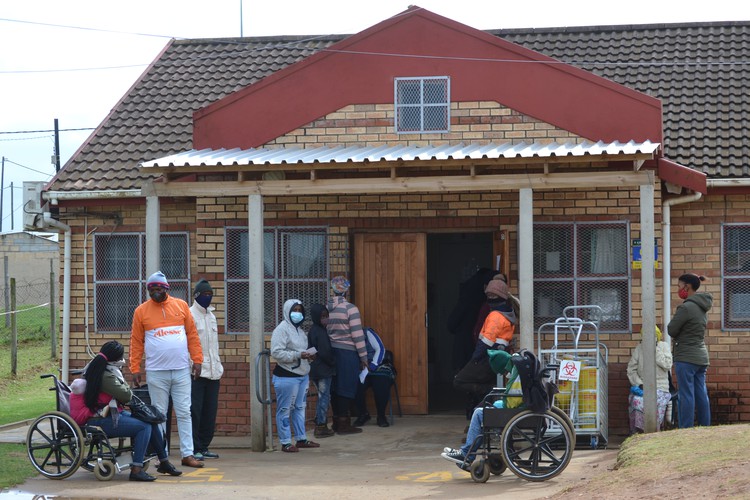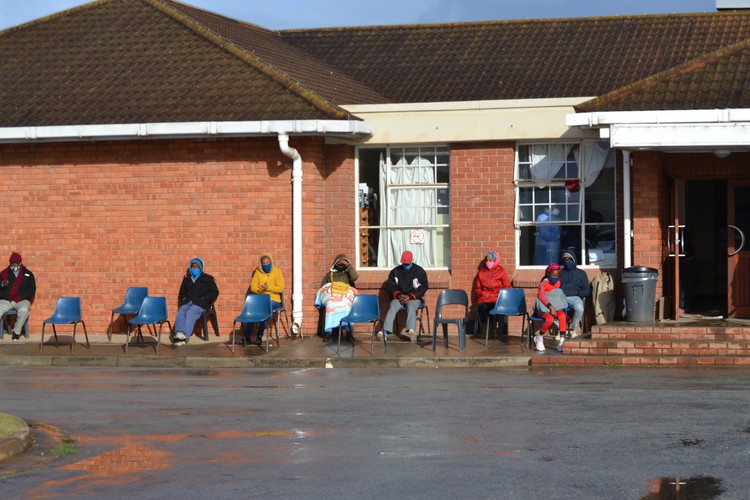Dire conditions in Eastern Cape clinics made worse by pandemic
“In the fight against Covid-19, we have neglected primary health care” says Human Rights Commission official
At Lukhanyo Clinic in Khayamnandi, patients in wheelchairs sit outside because the clinic has no room for a waiting area inside. The clinic was one of five public healthcare facilities visited by a delegation of activists and provincial health department officials last week. Photo: Thamsanqa Mbovane
- The Eastern Cape has, as measured by deaths relative to population size, been the worst hit province by Covid-19.
- The Treatment Action Campaign has been visiting health facilities in the province and has found them to be in poor condition.
Poor infrastructure, shortages of staff and medication, and ailing patients forced to wait in the rain — these were among the problems health activists and human rights monitors found at clinics in Uitenhage and Despatch last week.
“We are concerned that in the fight against Covid-19, we have neglected primary health care services especially in the Eastern Cape. Covid-19 is not raising new issues but rather highlighting pre-existing issues,” said Ncumisa Willie, research advisor to South African Human Rights Commission (SAHRC) chairperson Bongani Majola.
Willie joined a delegation of health department officials, monitors and members of the Treatment Action Campaign (TAC), Eastern Cape Aids Council, Eastern Cape Health Crisis Action Coalition, and the Civil Society Forum on visits to three public clinics in Uitenhage and two in Despatch last week. The delegation is expected to do spot visits at more health facilities in the province this Wednesday.
The Eastern Cape has been the province hardest hit by Covid-19 so far. The latest Medical Research Council mortality report estimates over 8,400 deaths more than historical trends would expect there to have been. This is by far the worst provincial excess death rate relative to population size in the country.
Over the past few weeks, the TAC and its partners have been monitoring the situation at clinics across the province. About a month ago, TAC monitors on the ground at Laetitia Bam Day Hospital witnessed confidential patient files being handed over the fence. The monitors said poor and sick people were exposed to all weather conditions and that physical distancing was not being encouraged by clinic staff.
Following a meeting with the Eastern Cape Department of Health, they decided to do a joint oversight visits at the 48 clinics in Nelson Mandela Bay metro.
TAC general secretary Anele Yawa said that once their oversight visits were completed at the end of August, they would release their findings in detail.
Last week, the delegation visited Nomangesi Jayiya in Khayelitsha, Rosedale and Lukhanyo clinics in Khayamnandi, and Gustav Lamour Clinic in Despatch.
During the visit Willie said that she spoke to some patients who complained about being turned away because clinics didn’t have chronic medication. “In some facilities where staff had tested positive for Covid-19, clinics closed making it impossible for users to access healthcare … We were also informed that due to fears of Covid-19, some clinics had resorted to dispensing medication through the fence. This is a clear violation of the right to privacy, which can also serve as a deterrent to patients who need to access HIV and TB medication due to fear of stigma.”
At Laetitia Bam Day Hospital, the largest clinic in KwaNobuhle, a nurse working in the trauma section told officials: “Patients are using a bed that is 15 years old. We always stand next to this bed because it’s unstable if you lean on it.” She also complained about how small the trauma unit is and that paint was peeling off its walls.
Patients wait outside Laetitia Bam Day Hospital in KwaNobuhle. Photo: Thamsanqa Mbovane
In the courtyard area, dozens of patients sat outside, against the wall while it was drizzling. Most of the clinic space was cordoned off due to a R3.9 million refurbishment project underway. Construction was to have been completed in November last year.
Anele Yawa of the TAC asked staff about the incomplete project. “Why are our people subjected to these conditions of sitting outside while it rains? Why has a project that was supposed to be completed last November not been finished?”
Clinical manager Phindi Ketshengane replied, “The refurbishment project will be completed. All the clinics in Nelson Mandela Bay were sponsored with tents in the past, in order for patients to sit in them and be safe. Those tents were taken away by the donor, because they were only for a certain period.”
At Lukhanyo Clinic in Khayamnandi, patients in wheelchairs are seated outside for about 30 minutes because the clinic is too small and has no waiting area inside.
Yawa told the delegation that he could only describe Lukhanyo Clinic as a toilet, because it was very small. He said cardboard boxes were scattered around its passages.
Facility manager Thumeka Xentsa said the clinic served over 10,000 people in and around Despatch.
Xentsa told the delegation: “When you are three staff members and you want to talk with one nurse, you must go outside into the yard because we don’t have space in here.”
At Gustav Lamour Clinic in Despatch, Yawa told the nurses and facility manager Elaine September that he had “thought this clinic is a tuckshop”.
The clinic, made out of prefabricated material, has been burgled several times and computers were stolen.
September said: “The clinic was closed once for a week during lockdown as the staff who tested for Covid-19 were waiting for their results.”
Yawa said TAC and its partners would continue their efforts to get government officials to account for the current deplorable state of facilities and poor access to healthcare exacerbated by the pandemic.
Next: Lockdown in pictures - Day 151: Smashed robots
Previous: City withdraws advert to lease golf club for less than R1k per month
© 2020 GroundUp. This article is licensed under a Creative Commons Attribution-NoDerivatives 4.0 International License.
You may republish this article, so long as you credit the authors and GroundUp, and do not change the text. Please include a link back to the original article.




